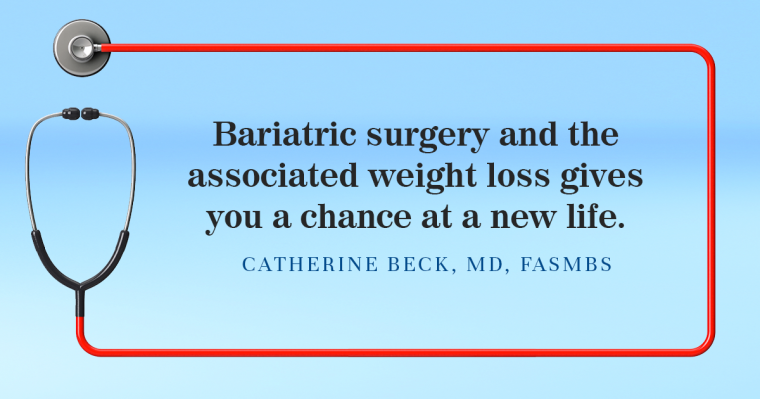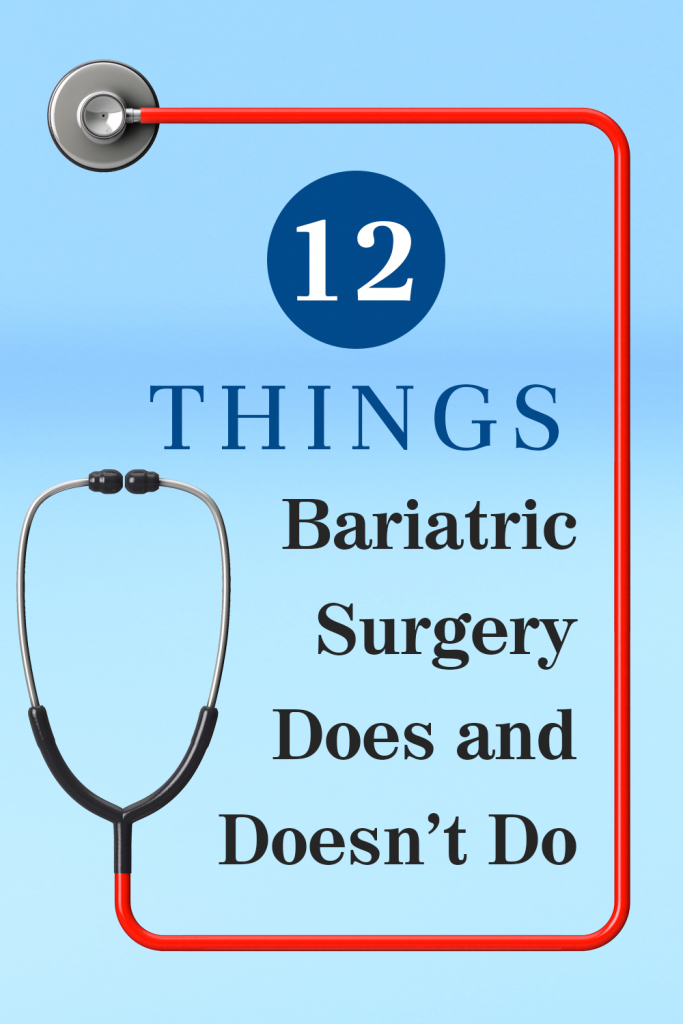
12 Things Bariatric Surgery Does and Doesn’t Do
January 17, 2022There are many things that bariatric surgery does for you and things that it doesn’t. For realistic expectations, review what bariatric surgery does and doesn’t do.
What DOESN’T Bariatric Surgery Do For You?
It doesn’t magically solve all your problems
- Surgery is not a one-stop shop for fixing all your problems. Surgery will help in so many ways but it isn’t a cure-all.
It doesn’t make it easier
- Despite popular belief, surgery is NOT the easy way out. Bariatric surgery patients have to do all the same things everyone else has to do to be successful in weight loss and then some. You still have to learn about nutrition, pay attention to what you eat and portion sizes, exercise, and keep these changes up for life. It’s not easier, you are just using all the tools available to help you succeed, and there is no reason not to do that.
It doesn’t do the same thing for every person in the same way
- It can be very tempting to join a Facebook group or other online group for support while losing weight. Sometimes it can be very helpful. But don’t compare yourself to everyone online. People have a tendency to only share their great successes or terrible, rare, complications. Not everyone starts in the same place, has the same surgery, loses weight at the same speed, and ends up the same weight. Only compare yourself to "the you" before surgery, not everyone else.
It doesn’t make weight loss happen overnight
- Weight loss is a process, a lifelong process. Some people get to their goal weight in 3 months; others it takes 2 years. But regardless of how fast you lose weight, the real goal is to keep it off, and that will take a lifetime. Most people can expect a 5-pound weight loss per week for the first 2-4 weeks. Then a 3 pound loss per week for 2 - 4 weeks, then a 1 pound loss per week until their goal. Everyone will hit a weight plateau during which no weight will be lost for a week or 2. That is normal! Don’t give up during that time period. Your body just needs time to adjust.
It doesn’t fix depression
- Patients often feel they are depressed because they are overweight. But very often, they are overweight because they are depressed. Depression and weight gain go hand in hand. You can’t fix one without fixing the other at the same time. Talk to your doctors about depression. Get a therapist that can help you learn about your emotional trigger to eat, to sleep, to not exercise. Also, beware that depression often worsens after surgery for a short period of time. A weight loss journey can be very isolating and lonely. Make sure you have proper support.
It doesn’t fix relationships
- Your spouse will not love you more if you lose weight. And in fact, the relationship may get harder if you lose weight and they don’t. Make sure your spouse is supportive of your decision to lose weight, whether with surgery or not. You don’t want them unknowingly sabotaging your progress. You don’t want them telling you that you can’t succeed. You want their support, encouragement, help holding you accountable and you want them to share and celebrate your success. Consider seeing a relationship counselor if you feel you need to lose weight for your relationship. Even if your partner is supportive, it can get tough. Always reach out for help when needed. Weight loss is a big change for the whole family.
What DOES Bariatric Surgery Do For You?
It does make weight loss more efficient and faster
- Average, successful weight loss is one pound per week with diet and exercise. This sounds great until you have been working hard for 3 months and only lost 12 pounds. This is especially true if your goal is to lose 100 pounds. Surgery will help you lose weight much faster. In large part, this is because surgery changes the way your body burns calories so you will burn more calories after surgery than before surgery even while eating the same things and doing the same exercise.
It does make you more likely to lose weight and get to your goal weight
- Statistically, Bariatric Surgery helps patients lose 60% of their excess body weight as compared to the 5-20% with medical weight loss or diet and exercise alone. 80% of patients will maintain a 50% loss of their excess body weight.
It does improve or resolve obesity-related comorbidities
- Many medical problems can be cured with weight loss from bariatric surgery. This includes diabetes, high blood pressure, high cholesterol, sleep apnea, arthritis, urinary incontinence, asthma, pseudotumor cerebri, reflux, infertility, PCOS, and fatty liver disease. Bariatric surgery will also lower your risk of many cancers including breast, colon, uterine, ovarian, thyroid, liver, pancreas, kidneys, stomach, esophagus, gallbladder, and meningioma.
It does help change your mindset and break the frustrating yo-yo cycle
- Weight loss is hard! Bariatric surgery makes weight loss more likely and helps break the yo-yo cycle of weight loss and weight gain. You are more likely to lose weight and keep it off which will create a positive feedback loop to encourage you to keep working towards weight loss because you will see success!
It does give you access to all the tools you need to lose weight
- Bariatric programs open the door to many resources, often for a small fee or no cost depending on your insurance. You will have access to nurses, surgeons, internists, mental health professionals, dietitians, physical therapists, and support groups that are all there to make sure you succeed.
It does help change your life!
Obesity is associated with singledom, disability, job loss, depression, anxiety, immobility, sexual dysfunction, low self-esteem, and poor social interactions. Bariatric surgery and the associated weight loss give you a chance at a new life. For most patients, the goal is not a number on a scale. Instead, it's to feel better, be able to play with kids on the floor, be able to walk, and spend time with family. Those are the most important goals and markers of success.
Catherine Beck, MD, FASMBS is Director of Bariatric Surgery for
The Utah Center for Minimally Invasive and Bariatric Surgery (CMIBS)

 | ABOUT THE AUTHOR Catherine Beck, MD, FASMBS is a board-certified general surgeon that specializes in minimally invasive gastrointestinal surgery, bariatric surgery, and robotic surgery. She serves as the Director of Bariatric Surgery for The Utah Center for Minimally Invasive and Bariatric Surgery (CMIBS) at Jordan Valley Medical Center, a Steward Family Hospital. With skill and expertise, Dr. Beck also specializes in the surgical treatment of reflex, hiatal hernias, and esophageal dysmotility. She also performs gallbladder surgery, hernia surgery, abdominal wall reconstruction, endoscopies, and trauma and acute care surgery. |



